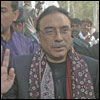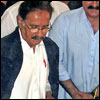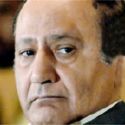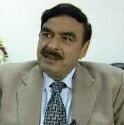




The Victors
and the Vanquished

2008 .... Would Things Change??
|
|
 |
|

 |
||||
|
The Victors |
and the Vanquished |
||||||
|
|
Perhaps 2008 would be one of the most crucial years of Pakistan's turbulent past - since this year a new political era is in the offing. A year when two arch rivals (PPPP and PML-N) are to forge a new political alliance forgetting the bitter past when Nawaz Sharif labeled a number of allegations against Benazir Bhutto and her husband Asif Ali Zardari. These allegations dragged Zardari into courts and jails for years and even government of General Pervez Musharraf took some time to release Zardari and allowed him to go abroad. It was again General Pervez Musharraf who allowed Benazair, Zardari and Nawaz back into the country in what was called a National Reconciliatory Ordnance, specially promulgated to allow PPPP to form new government in Pakistan. Things however did not work well and no deal could be struck between the government and PPPP. With the tragic death of Benazir in a bomb blast in Rawalpindi on 27 December 2007, the entire political canvas changed and brought to fore Asif Ali Zardari as co-chairperson of PPPP. After the elections of 18 February 2008, many of the King's party tumbled and the ruling party of PML (Q) crumbled agianst the PPP and PML (N).
The first budget presented by the PPP government failed to address the issues of load shedding, the price hike and the law and order in the country. It also failed to stop the cross border attacks by the US-led coalition forces, which recently killed scores of civilians including 11 military personnel (one major included). This In the meantime, the country is in a grip of high inflation, high oil prices, shortage of wheat and acute shortage of electricity. But the judges issue seems to have overtaken every other issue - so while the people lament and suffer for want of food and electricity, the politicians, specially the PML (N), seem busy only in one issue - restoration of the judges and impeachment of the president.
There have been developments of impeachment of the president by the ruling coalition since long, which coupled with the restoration of the judges was taking a heavy toll of the Pakistani economy which was nose diving and the Re had gone the lowest ever in the history (Rs.77+ for 1US $) and the stock market had came back to under 10,000 points after sky rocketing over 15,000 points. The country was in a grip of despair as everyone seemed to be obsessed by the president's impeachment and the judges issue. While the charge sheet against the president was being readied, and all the four provincial assemblies have unanimously demanded resignation of the president, the hard decision finally came on midday 18 August when in a live TV broadcast, president Pervez Musharraf bid farewell to the presidency after a sentimental speech of over one hour. In his address to the nation, he said he was stepping down to avoid confrontation between the institutions and presidency and the parliament and in the best interest of the nation and to save the country from further destabilization. He said for him it is always Pakistan first and added that politics of confrontation must come to an end and instead a policy of reconciliation be pursued. The President said he took all decisions with consultation, took all stake holders onboard, on the most difficult issues. He dismissed what he called the false allegations being leveled against him and said he was neither afraid of the charges against him, nor shy to face them through impeachment. He said no charge sheet can stand against him and not even a single charge can be proved. He stressed immediate measures be taken to arrest the economic downturn and said the nation has the resilience to withstand any challenge. Thus ended another era of Pakistan history which started in 1999 - with the democracy now fully independent, the ball is now in the court of the PPP and PML(N) to put the country back to normalcy and pave way for the future rather than still clinging to settle old scores. The judges issues still hangs in balance - another test for the rulers.
So from now on, Pakistan moves in a pure democratic set, wherein both the president and the prime minister have been elected with a heavy support of the elected representatives. It is hoped now that a new era will be ushered in the history of Pakistan - an era of progress and stability. 20th of September would be remembered as a fateful day in the history of Pakistan - a day when Mr Asif Ali Zardari, a civilian president after a decade of military rule addressed the joint session of the parliament - and a day when just hours after a powerful bomb blast completely destroyed the Islamabad Marriot Hotel, leaving some 50 dead and over 300 injured. While the Pakistanis want to go ahead and live in an economically healthy country, there are some cloaked in the garb of Islamists who want Pakistan to be taken back to dark ages - with people being executed on streets publicly, and men ready to kill any woman that comes out of her home without "hijab" - men who want to show their muscles not by their intellect or brain but on the strength of the weapons they hold. Who is behind all this - we may never know but one wonders what would become of Pakistan in days to come. |
||||||
|
|
Supreme Court strikes down Nov 3 emergency: In what has been billed as a verdict that may change the course of the country’s political and judicial history, the Supreme Court on Friday 31 July 2009 denounced successive military takeovers over the past four decades and their endorsement by the superior judiciary and then went ahead to declare Gen Pervez Musharraf’s Emergency Order of Nov 3, 2007, and most of the actions taken under it, including the appointment of over 100 superior court judges, as illegal and unconstitutional. In a judgment that has no precedence in the country’s judicial history, a 14-judge bench, headed by Chief Justice Iftikhar Mohammad Chaudhry, declared unconstitutional Justice Abdul Hameed Dogar’s appointment as the Chief Justice of Pakistan after the imposition of emergency. The court decided to refer to the Supreme Judicial Council the cases of Justice Dogar and other judges who had defied the order of a seven-judge bench on the same day and took oath under the PCO. Operation Rah-e-Rast: The menace of militants threatening life and property of FATA (specially the North and South Waziristan) and Swat/surrounding areas finally compelled the government to launch Pakistan Army to quelch the militancy. The operation code named "Operation Rah-e-Rast" is continuing with moderate to high degree of success and Army claims big gains. However, the militants presumably backed by some foreign neighboring countries reappear in other areas, equipped with most modern communication equipment and small arms. The western media on the other hand, taking advantage of the fragile law and order situation, laments threats to Pakistan's nuclear arsenal - many believe that the entire game plan from 9/11 onwards and gradually inching in of the NATO and other forces towards Pakistan, including onslaught of hired militants in the name of Islam, is in fact to neutralize Pakistan's nuclear capability. In the meantime, while the US Army drones continue to "destroy" targets inside Pakistan territory, a similar attack by the Predator drone claims to have killed the much wanted militant Baitullah Mahsud which is not only likely to divide the so-called Taliban in Pakistan but also bring down militancy. Most people are keeping their fingers crossed since unless foreign involvement is not neutralized, militancy in Pakistan would take time to finish. 16 December 2009 - A day in life of Pakistan: The day when the Supreme Court of Pakistan unanimously annulled the most controversial act of a military ruler – the NRO. An order due to which many a criminals were granted amnesty and heinous crimes of money laundering, fraud, murders and other misdeeds were absolved of the committed crimes. Now people of Pakistan can hope for justice. The month of April 2010 saw the much awaited passing of the The Eighteenth Amendment to the constitution by both the parliament and the senate and signed by the president is being viewed by many as a democratic victory as has undone many clauses by the successive military rulers to strengthen their hold on the seat of the presidency and making the prime minister as a rubber stamp. Now the president's only function, role and duty, not authority, will be to simply put his signatures on recommendations sent to him by Prime Minister in different spheres. It will become mandatory for the president to sign the notifications for appointment of official functionaries, summon the Senate, the National Assembly and their joint session, dissolve the lower house of parliament and assign legislation to the government, each and every thing proposed by the prime minister. The amendment abolishes the “concurrent list” and gives much more provincial autonomy than is now available to the provinces. The Council of Common Interest has been given additional powers and the provinces have been given more say on national matters by enhancing their representation in the council. With the passing of the amendment, the erstwhile NWFP (North West Frontier Province) becomes Khyber-Pakhtunkwa. Although the renaming has been viewed by many non-pushto speaking residents of the province as a blow to their status and already there are demands of more provinces to be carved out of the Khyber-Pakhtunkwa to suit their languages and aspirations. |
||||||
|
The operation 'Kill OBL" in May 2011 had a negative fallout on the politics of Pakistan. It created a rift between the government and the Army and ISI for the blame game. Amidst allegations and mistrust, the Memogate Scandal surfaced. It was alleged by a Pakistani American citizen Mansoor Ijaz that he had been approached by the Pakistan Ambassador to USA to deliver a letter from someone very high and important to Admiral Mullen of the USA. The contents of the letter mainly focused on saving the civil government from a possible coup by the army, and in return offered some very lucrative concessions to the USA. army has since reacted very strongly and the matter is in the Supreme Court as well as being investigated by a parliamentarian committee. At the time of updating the site, news is that Mansoor Ijaz is all set to come to Pakistan and appear before the court and the committee to provide details of the entire scandal. |
|||||||
| In the meantime the Supreme Court hearing the case of the notorious NRO, ordered the Prime Minister to appear before the court on 19 January in the case of the the contempt of the court for not implementing the court order of 2009 to write to the Swiss authorities to re-open the case which implicates the president Zardari for illegally sending out $600 million in his Swiss bank account. Though the PM appeared before the court, more than the contempt, the president's immunity came to forth as a disputed case. The government is to present its answer soon - which would decide the future course of action in the politics of Pakistan. | |||||||
|
On 19th June, in what was an expected
move by the Supreme Court of Pakistan, after government's persistent refusal to
write letter to the Swiss Government to re-open cases against the president,
the 'unanimously elected' Prime Minister Yousaf Raza Gilanai was
sacked and ordered to relinquish his office immediately. The 16th prime minister
of the country and first from the Seraiki belt, ruled for a longer period
compared to most of his predecessors, is the first head of government who lost
his office after being disqualified by the Supreme Court. Prime ministers
Muhammad Khan Junejo, Benazir Bhutto and Nawaz Sharif had been dismissed by the
then presidents, who had the constitutional power to do so, on various charges. |
|||||||
|
| HOME PAGE | |1947 - 1958 | 1958 - 1968 | 1968 - 1977 | 1977 - 1988 | 1988 - 1999| 1999 - 2008 | Copyright©JalalsPages - 2007 - 2012 |